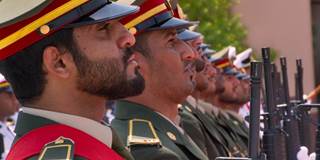The recent framework agreement on Iran's nuclear program represents progress on one major security challenge in the Middle East. But, as some Arab countries move to establish a joint military force, another security question is emerging: Will such an alliance leave the region better or worse off?
LONDON – The framework nuclear agreement that Iran and the P-5 (China, Britain, France, Russia, and the United States) plus Germany recently reached represents progress on one major security challenge in the Middle East. But, as some Arab countries move to establish a joint military force, another security question is emerging: Will such an alliance leave the region better or worse off, particularly given today’s growing Sunni-Shia divide?
A nine-country Saudi-led coalition, which includes Egypt, the United Arab Emirates, Kuwait, and Jordan, is already carrying out airstrikes against the Iran-backed Houthi rebels in Yemen – an effort that Iran’s Supreme Leader Ali Khamenei recently declared will end with the Saudis’ “noses [being] rubbed to the soil.” Yet Egypt’s president, General Abdel Fattah el-Sisi, has indicated that the coalition’s mandate may be extended beyond Yemen.
But what is that mandate?

LONDON – The framework nuclear agreement that Iran and the P-5 (China, Britain, France, Russia, and the United States) plus Germany recently reached represents progress on one major security challenge in the Middle East. But, as some Arab countries move to establish a joint military force, another security question is emerging: Will such an alliance leave the region better or worse off, particularly given today’s growing Sunni-Shia divide?
A nine-country Saudi-led coalition, which includes Egypt, the United Arab Emirates, Kuwait, and Jordan, is already carrying out airstrikes against the Iran-backed Houthi rebels in Yemen – an effort that Iran’s Supreme Leader Ali Khamenei recently declared will end with the Saudis’ “noses [being] rubbed to the soil.” Yet Egypt’s president, General Abdel Fattah el-Sisi, has indicated that the coalition’s mandate may be extended beyond Yemen.
But what is that mandate?